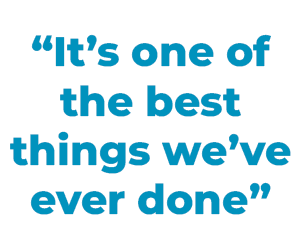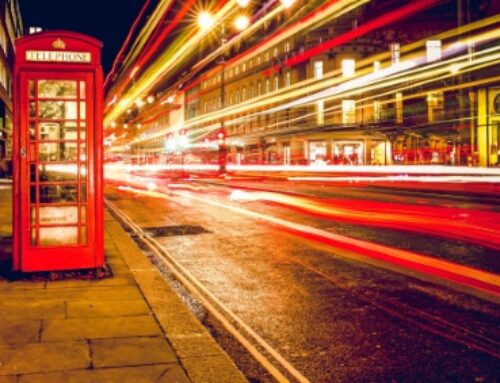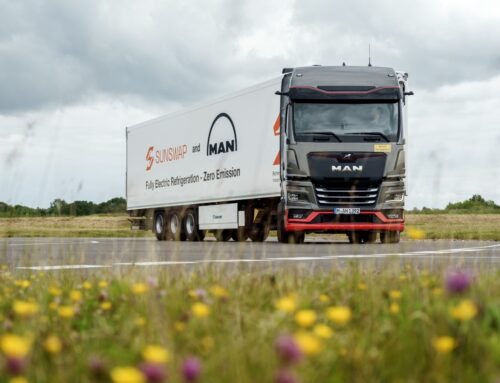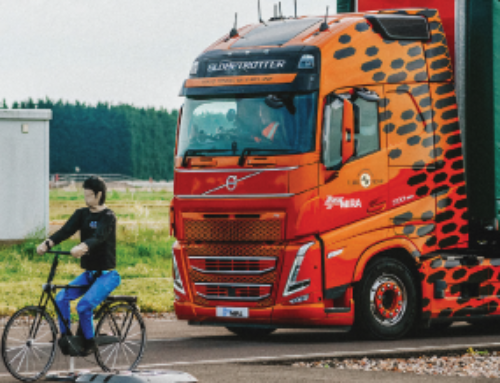MAN to put hydrogen combustion truck into production
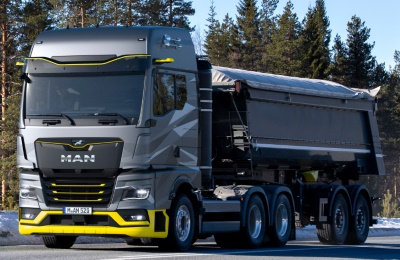
MAN’s 6×4 hTGX undergoing cold-weather trials last winter. The vertically-mounted hydrogen tanks are behind the cab
Traton subsidiary MAN is set to be the first European truck manufacturer to put a hydrogen combustion- powered truck into production, with the first units appearing this year.
They will use a modified version of the MAN D38 diesel engine.
An initial small series production of around 200 units is to be delivered to customers in Germany, the Netherlands, Norway, Iceland and selected non-European countries.
The MAN hTGX, as the vehicle will be called, offers an alternative zero-emission drive variant for special applications, for example: construction work, tank transport or timber transport.
The hTGX can also be an environmentally-friendly alternative to battery-electric trucks for use in areas without sufficient charging infrastructure or for markets where sufficient hydrogen is already available.
The hydrogen engine is being introduced on a similar timescale to MAN’s electric offering. It will hand over its first battery-electric trucks to customers for the first time in 2024 and scale it up from 2025. MAN has been the market leader for electric city buses in Europe since 2023.
Friedrich Baumann, director of sales and customer solutions at MAN Truck & Bus, said: “We are continuing to focus on battery-electric vehicles to decarbonise road freight transport. These currently have clear advantages over other drive concepts in terms of energy efficiency and operating and energy costs. However, trucks powered by hydrogen combustion engines are a useful addition for special applications and markets.
“We anticipate that we will be able to best serve the vast majority of our customers’ transport applications with battery-powered trucks. For special applications, hydrogen combustion or, in the future, fuel cell technology is a suitable supplement. The hydrogen combustion engine H45 is based on the proven D38 diesel engine and is produced at the engine and battery plant in Nuremberg.
“The use of familiar technology enables us to enter the market at an early stage and thus provides a decisive impetus for the ramp-up of the hydrogen infrastructure. With the hTGX, we have now added an attractive product to our zero-emission portfolio.”
Hydrogen is particularly suitable for special transport tasks that require a multi-axle configuration or where specialist bodywork leaves no space for the batteries on the chassis-frame.
The MAN hTGX offers high payloads and maximum ranges of up to 600 kilometres in its initially offered 6×2 and 6×4 axle variants. The H45 hydrogen combustion engine used has an output of 383 kW or 520 hp and a torque of 2500 Nm at 900-1300 rpm.
The direct injection of hydrogen into the engine is said to ensure particularly fast power delivery. With hydrogen compressed to 700 bar (CG H2) and a tank capacity of 56 kg, the vehicle can be refuelled in less than 15 minutes. With less than 1g CO2/tkm, the MAN hTGX will fulfil the criteria as a “zero-emission vehicle” under the new planned EU CO2 legislation.
Dr Frederik Zohm, director of research & development, added: “The new CO2 regulations at EU level will classify trucks with hydrogen combustion engines as zero-emission vehicles. This means that such vehicles fully contribute to our CO2 fleet targets, which also opens the door for this small series that complements battery electric vehicles. At the same time, depending on the country, our customers benefit from corresponding toll reductions.
“At MAN’s Nuremberg site, we have the most innovative engine technology and decades of experience in the use of hydrogen as a fuel.
“We are utilising this and presenting a real MAN with the MAN hTGX. The new hydrogen-combustion truck is based on the tried-and-tested TG vehicle series and impresses with the highest quality and uncomplicated maintenance. We will continue to research fuel cell technology based on battery technology and hydrogen. However, it will be several years before the technology is really ready for the market and competitive.”
MAN Truck & Bus presented the first hydrogen-powered bus at the Hanover IAA in 1996: the SL 202 city bus was powered by a natural gas engine that had been modified for hydrogen fuel. The vehicle then completed a three-quarter year test phase in Erlangen, during which it travelled 13,000 kilometres and carried 60,000 passengers.
The bus finally arrived in Munich in 1997 and was successfully deployed in regular service there. This was followed in 1998 by three articulated buses for Munich Airport, which were used until 2008, and a further 14 hydrogen-powered buses between 2006 and 2009.


